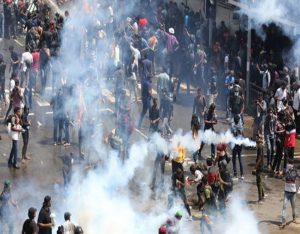 Colombo: Embattled Sri Lankan President Gotabaya Rajapaksa’s whereabouts was not known after he was moved out of his residence on Friday ahead of Saturday’s protests during which thousands of irate anti-government protesters stormed into his official residence in Colombo.
Colombo: Embattled Sri Lankan President Gotabaya Rajapaksa’s whereabouts was not known after he was moved out of his residence on Friday ahead of Saturday’s protests during which thousands of irate anti-government protesters stormed into his official residence in Colombo.
Rajapaksa, who was facing calls for resignation since March, was using the President’s House as his residence and office since protesters came to occupy the entrance to his office early April.
According to sources, the President had been moved out of his residence on Friday, in anticipation of Saturday’s protests. His whereabouts was unknown as protesters have now occupied both his office and official residence.
Reports have surfaced that luggage was rushed on to the Sri Lanka Navy Ship Gajabahu anchored at the Colombo Port, News 1st channel reported on Saturday.
“The Harbour Master at the Colombo Port said that a group boarded the SLNS Sindurala and SLNS Gajabahu and left the port,” it added.
He said he cannot provide details of the manifest or about those who boarded the vessels, the channel said.
Earlier, a viral video on social media showed a VIP motorcade reaching the Colombo international airport where a SriLanka Airlines aircraft was parked.
At least 30 people, including two policemen, were injured in clashes between security personnel and protesters – some of them holding Sri Lankan flags and helmets – who had gathered in large numbers in the Fort area, demanding President Rajapaksa’s resignation.
Protesters who climbed the walls of the President’s House are now occupying it without damaging any property or indulging in acts of violence.
Video footage from inside the building showed hundreds of protesters packing into rooms and corridors, while hundreds also milled around the grounds outside.
Some video clips showed scores of people taking a dip in the presidential palace pool.
A group of his own parliamentarians have addressed a letter to President Rajapaksa, urging him to step down and appoint a new Prime Minister and an all-party government.
Sri Lanka, a country of 22 million, is under the grip of an unprecedented economic turmoil, the worst in seven decades, crippled by an acute shortage of foreign exchange that has left it struggling to pay for essential imports of fuel, and other essentials.
